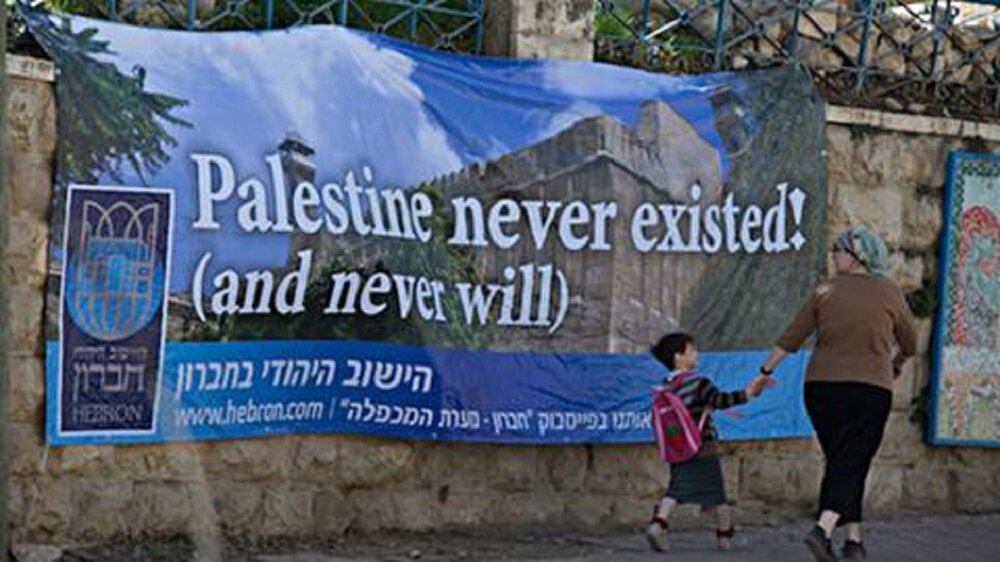Hawzah News Agency –Zachary J Foster completed his PhD in Near Eastern Studies at Princeton in 2017. His dissertation is titled, "The Invention of Palestine." He is a Director of Product of Academia.edu, and he wrote about this issue:
“Palestine never existed and never will.” So read a 2017 poster in the Jewish settlement of Hebron, located in the heart of the Occupied Palestinian Territories, or Palestine.
For decades, Zionist propagandists have tried to convince us all that throughout history, Arabs never called the place Palestine (spoiler alert: they did).
Mainstream American politicians like Ted Cruz, Mike Huckabee and Newt Gingrich have regurgitated the talking points that “there was no Palestine” and “there were no Palestinians”. And if they never call the place Palestine, and they never thought of themselves as Palestinians, so the nationalist logic goes, then what claims do they have to an independent Palestinian state in the first place?
This is the narrative I grew up with in Jewish Zionist schools, summer camps and youth groups. That’s what led me down the Palestine history rabbit hole and why I ended up writing my PhD dissertation on the name, Filastin, or Palestine. I was desperate to know: were the pro-Israel affictionados correct? What did people call the place?
For decades, the conventional wisdom was that the word Palestine fell out of use in the Arab world after the 11th-century Crusader conquest until its mid-late 19th-century revival.
Even some pro-Palestine historians held this view, including Beshara Doumani, who wrote in his 1995 classic, “Rediscovering Palestine Merchants and Peasants in Jabal Nablus, 1700-1900”, that: “It is doubtful whether the name Palestine was commonly used by the native population to refer to a specific territory or nation before the late 19th Century.”
But, nearly three decades later, we have a much richer understanding of who called the place Palestine, when, where and why.
When Muslims conquered the Middle East in the 7th Century, they converted the Byzantine districts of Palæstina Prima and Secunda into a district called Jund Filastin. For the next three centuries, Palestine was thus an administrative district, with Ramla as its capital.
During this time, Muslims wrote many works of literature, belles lettres, biographies, history, geography and law in Arabic. This literature is replete with discussions of Palestine’s geography and history.
Muslim commentators like Ibn al-Faqih (d. 902) and al-Bakri (d.1094) even debated the origins of the word Filastin itself, believing (incorrectly) that it came from a descendent of the Biblical figure Noah named Filastin who settled down in the region after the flood.
These earlier works came to be seen as more authoritative than later works, and so they were cited, quoted, collated and analysed for centuries. This prolonged the life of geographical terms like Palestine that were popular during the early days of Islam.
The great historian Shelomo Dov Goiten summarised the point well: once a description or genealogy was embraced as part of the historical tradition, “everyone versed in the technique of Arabic historiography knows that it appears again and again in later compilations”. It was thus incumbent upon writers in the 12th, 14th, 16th and 18th centuries to cite the earlier sources of the tradition, and so Palestine crept into everything they wrote.
And so while the name Palestine receded in popularity at the administrative level, and consequently, colloquial level, it retained its currency among intellectuals. For the same reason intellectuals today write and talk about Constantinople or Edom, Muslim intellectuals wrote and talked about Palestine continuously over the past millennium.
There was one place, though, where people seem to have remembered Palestine, and used that word in their day-to-day speech. That place was Ramla, located about half way between what is today Tel Aviv-Jaffa and Jerusalem.
That is because, during the early Islamic period, the ‘Umayyad Caliph Sulayman ‘Abd al-Malik (d.717) moved the seat of the Muslim Empire from Damascus to Ramla, and Ramla remained the political, geographic and economic centre of the District of Palestine for hundreds of years.
It was only in 1068 when a massive earthquake decimated Ramla, and later when the entire region became engulfed in the Crusader Wars by the end of the 11th Century, that Ramla declined in importance.
But a closer look at Arabic sources over the past half millennium reveals that people in Ramla continued to call the place Palestine. The 15th-century scholar Abu al-‘Awn al-Faruqi (d.1504), for instance, is identified on his tombstone in the city of Ramla as a scholar from the “Palestinian frontiers”.
The famous 17th-century jurist from Ramla, Khayr al-Din al-Ramli (d. 1671), used the word Palestine at least three times in his collection of fatwas, or legal interpretations. He mentioned, in one case, that Palestine’s northern border was either “‘Uyun al-Tujjar or Acre”, a definition of Palestine I’ve not seen elsewhere, suggesting he had his own unique image of Palestine in mind.
His son, Najm al-Din (fl. 1718), lived his entire life in Ramla and also used the word Palestine very casually multiple times in a collection of religious certificates he wrote for his father.
The 18th-century Arab Orthodox priest, Yusuf Jahshan (c. 1760s), born and raised in Ramla, wrote a copy of the Book of Daniel, mentioning the word Palestine more than a dozen times in 90 small folios of text.
So Palestine was known to intellectuals and scholars as the erstwhile name of the place, while it was known to people in Ramla and its surroundings as the name of the place they were born in, raised in and died in.
Alas, it’s time to put to rest the false idea that Palestine was forgotten.


Your Comment